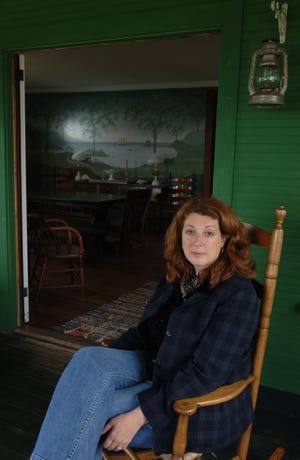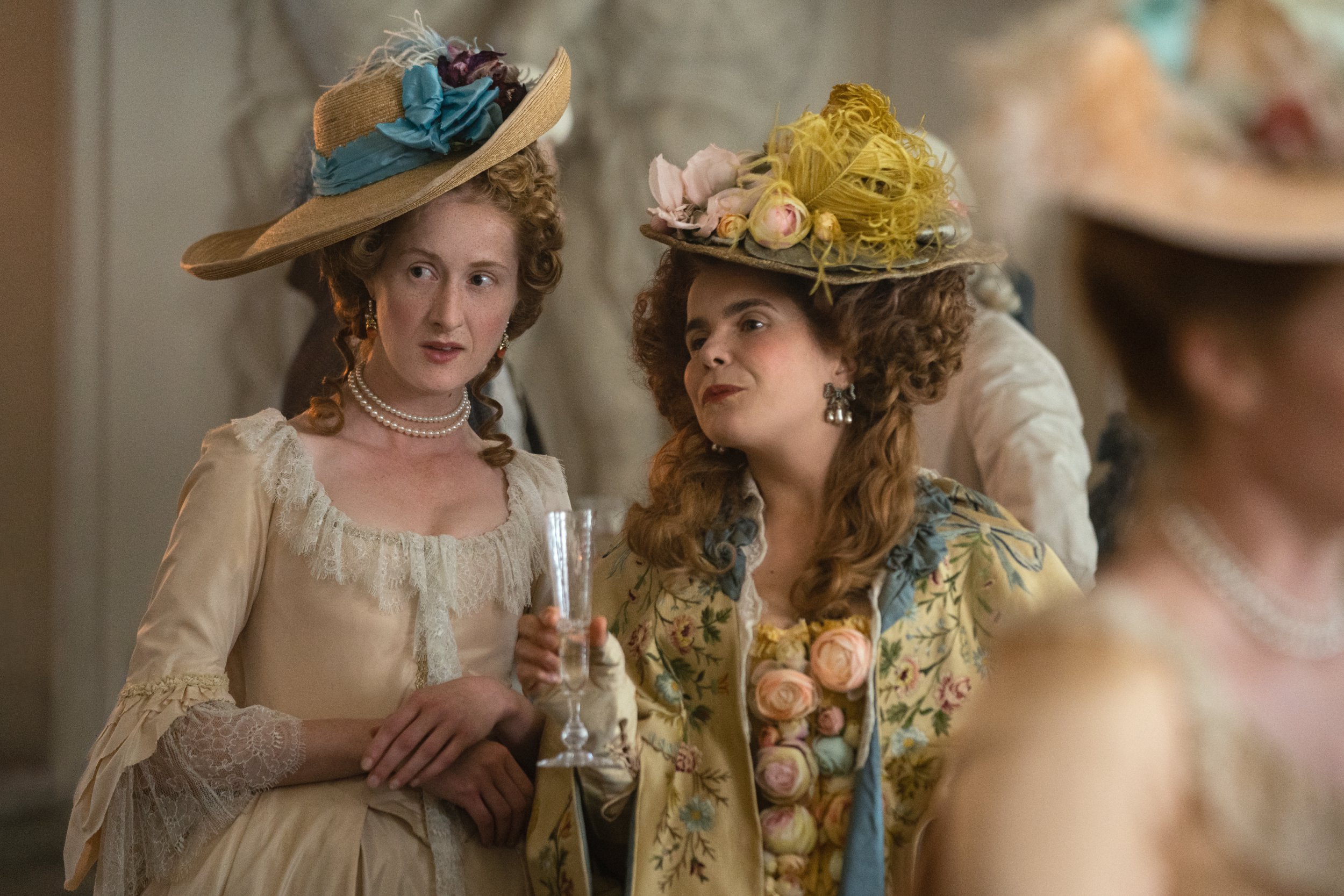People kept saying the movie “Wild About Harry” was ahead of its time. But maybe now, the time is right.
At least that’s what co-writer/director Gwen Wynne and producer James Egan hope as their 2009 movie — based on Wynne’s real life in Dennis and filmed on Cape Cod in 2007 — gets a relaunch. And the story may get turned into a television series.
The new road begins at 6 p.m. Saturday with a “sneak premiere” as part of the Hyannis Film Festival’s two-day “Movies on Main” event before “Wild About Harry” debuts Dec. 17 on Video on Demand. The film is then due to move to a not-yet-revealed major movie-streaming service.
So what’s different 12 years after the film’s original release? A greater acceptance of gay-themed films, growing support for women directors and women’s stories, and a pandemic that left streaming services short on content, say Wynne and Egan.
What’s not different? That the story about two teen girls in 1973 realizing their widowed father is gay, and what might happen if word gets out, still resonates, they say — especially considering the U.S. Supreme Court decision in June to affirm that the Catholic Church could refuse LGBTQ couples as adoptive parents.
“The story is timeless, it’s entertaining, it’s still relevant,” Egan says.
It’s also largely true.
First ‘Movies on Main’ fest:Movies back in downtown Hyannis for two-day event
“Wild About Harry” has “always been like the outsider film because there’s never been a family gay film like this,” Egan says in a joint phone interview with Wynne. “There’s never been a story told by the children of gay parents. … That’s what drew me to the project from the very beginning — that this was a fresh new attitude towards an issue that we’ve never seen before. And who could tell it better than someone who grew up like that?”
The real-life story
Wynne says her mother died when she was 11, and Mr. Phipps — her widowed father’s lover, named Mr. Gibbs in the movie — moved in with the family in the mid-1970s when they lived in New Jersey. The family was ostracized there, Wynne says she has since realized, so they moved to Route 6A in Dennis in 1976.
There, Mr. Phipps had a shop in the back of the house and separate bedroom, just like in her screenplay, and the men became friendly with many Cape artists, including Richard Howard. Her father helped in the shop in part so he could be home when his daughters came back from school and no one could accuse him of being a negligent parent, Wynne says.
“He was very afraid that my mother’s parents would take us away,” she says. “I know that they were thinking about it.”
Unlike in the movie, Wynne — a 1980 graduate of Dennis-Yarmouth Regional High School — and her younger sister didn’t reveal their father’s unusual living arrangement or talk to their father about his homosexuality while still teens.
“When we were playing (the film) at festivals, it was like I was coming out because I was afraid, through my young adulthood,” to reveal the family secret, Wynne says. “Nobody knew that my father was gay.” She recalls fundraisers she did for the film at Cape Cinema in Dennis that high-school friends attended.
“They said, ‘That’s why you never invited us over to your house,’” Wynne says. “My father didn’t want anyone to come to the house because he was afraid that we’d get taken away. My dad was very private, so it was very interesting seeing my high school friends who are now grown adults, mothers, parents etc. and their reaction to (the film).”
The movie, she says, “really was important, at least for me artistically, to make. And in a sense, I was also finding my voice.”
And giving a voice to others — which could potentially happen again when the movie is seen on the Cape, on demand and through the streaming release.
Egan recalls the world premiere of “Wild About Harry” at the 2009 Palm Springs International Film Festival that included an invitation to an organization for gay parents and their children — in a time before gay marriage was legal.
“There was a standing ovation, I mean like a long, emotional standing ovation,” Egan says. “A lot of the people came up and said, ‘This is the first time I’ve seen my story. Thank you.’ It was a very emotional experience.”
Wynne, who was initially a theater director and started her own theater company in Washington, D.C., says she only wrote her family’s story down in the 1990s when she was in film school, long after Mr. Phipps had died of AIDS. After reworking the screenplay with a co-writer, Wynne ended up back in Dennis in 2007 to film it and found a supportive community for her efforts.
Location was important for her first directing job. “I kept on saying I need this incredible light that only the Cape has, that brought so many painters and artists to the Cape. I wanted to capture that.”
Egan, who lives on Buzzards Bay, became producer on the film in part, Wynne says, “because he got it, he really got what the film was about.”
The first life of ‘Harry’
The movie — originally called “American Primitive” — stars Tate Donovan (TV’s “The O.C.,” “Damages”) as the character based on Wynne’s father; Adam Pascal (Broadway’s “Rent”) as his lover; Danielle Savre (TV’s “Station 19”) and Skye McCole Bartusiak (“The Patriot,” “Riding in Cars With Boys”) as the sisters; Josh Peck (TV’s “Drake and Josh,” the new “How I Met Your Father”); James B. Sikking (TV’s “Hill Street Blues”); and Susan Anspach (“Five Easy Pieces”).
“Wild About Harry” was a hit at film festivals. But it never got national distribution, largely, Wynne and Egan say now, because of the business model then of selling DVDs and the refusal of some big marketers, like Walmart, to sell gay-themed films.
“We made it at a time when there were no gay family films,” Wynne says, noting “Wild About Harry” is really the teen sisters’ story and told from their point of view.
Egan adds: “In those days, women protagonists were not considered financially viable in the (movie) theater. It took Thelma and Louise going over a cliff to convince people that there was an audience for women. … Unless it was a Disney film and she was a princess, you were not gonna get any kind of (major studio) to take that kind of risk.”
Document:New documentary about Brewster’s Greg O’Brien shines light on Alzheimer’s disease
Times have changed somewhat related to women, though, and that DVD business model has been up-ended by streaming services like Netflix and Amazon Prime, they say, especially since the pandemic began.
In the time between, both Wynne and Egan went on to multiple other projects. Wynne has two production companies, including Cape Cod Films, and launched a new global initiative, the Eos World Fund, to support female directors and minorities by financing and championing their movies. Her focus on “untold stories” includes the PBS show “Tyrus,” about a Chinese immigrant who became a top Hollywood concept artist; “Al Garib (The Stranger),” set in the occupied Golan Heights that she executive-produced with director Ameer Fakher Eldin that just premiered at the Venice Film Festival. and an in-progress episodic spy drama about intelligence agents during WWII.
Egan has focused his writing/producing on “media that makes a difference,” including 2019’s award-winning “Raise Hell: The Life & Times of Molly Ivins”; “Kimjongilia,” about survivors of the labor camps in North Korea; and the in-production “Fightback,” about women around the world teaching others self-defense to stop physical and sexual abuse.
Wynne says she hadn’t realized how hard it would be to work as a woman director in Hollywood and Egan, who has worked largely with women directors, says he’s glad to see some more opportunities now — including recognition for Wynne.
“It’s important for us to hear women’s point of view in media because it is life-changing for us,” Egan says. “We need new solutions. And women have that perspective, as outsiders, to bring a fresh perspective to the world. As artists, they can make these changes happen because we need them … and women are that powerful voice for change.”
The second life of ‘Harry’
The idea for them to revisit “Wild About Harry” began in part because Egan’s partner, Dan Perdios, wrote a book, published earlier this year, called “A Golden Retriever & His Two Dads: An Adventure on Cape Cod.” The story takes place on the Dennis set of “Wild About Harry” and the couple rewatched the film to get the details right.
“I said, ‘This is a fantastic film. We’ve got to get this film out there,’” Egan says.
And because streaming services now welcome gay subject matter and there was a lack of content with filming shut down during the pandemic, Egan said, companies were suddenly interested.
“The great thing is that the paradigm for distribution has changed dramatically,” he says. “Netflix and Amazon turned everything upside down and COVID made people desperate for content and … suddenly we were now viable in the marketplace.”
Participation this summer at the Martha’s Vineyard African American Film Festival helped connect Egan to those now working to get “Wild About Harry” a larger audience. “We had five or six digital platforms interested right away … and the film’s going to finally reach the audiences.”
Fall reading ideas: Here are 5 new books by Cape Cod & Islands authors
Beyond the future of the movie itself is continuing the story as a possible television series, which Wynne and Egan are working on now. She hopes to draw in other parts of 1970s Cape Cod — the Indigenous community, people of color, the fishing community, immigrants, LBGTQ friends — to expand on various aspects of what it was like to live here almost 50 years ago. She even mentions the possibility of using local artists, like Edward Gorey, as characters.
A TV series set around the “Harry” story would be “a way to preserve the history because the ‘60s and the ‘70s, that whole time, was a very rich moment on the Cape,” she says.
And would she return to film the TV series on Cape Cod, too? “We’d love to do that,” Wynne says. “It’s a fascinating place. I love it.”
Contact Kathi Scrizzi Driscoll at kdriscoll@capecodonline.com. Follow on Twitter: @KathiSDCCT.








